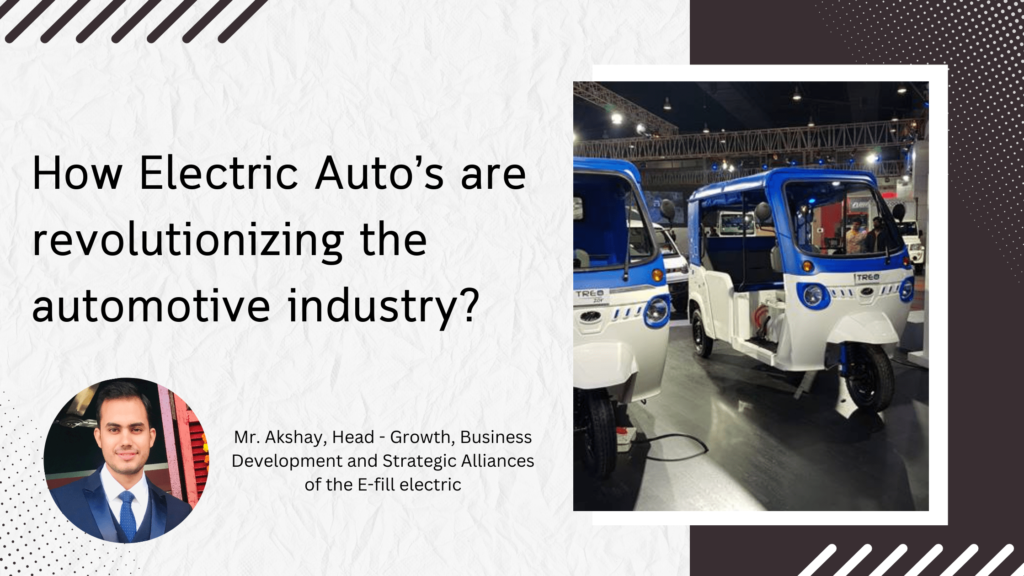
How is the Electric Auto revolutionizing the automotive industry and what will be its future?
An editorial by Mr. Akshay, Head – Growth, Business Development and Strategic Alliances of the E-fill electric
The electric auto revolution is transforming the automotive industry in profound ways, with significant implications for the future of transportation in India. As the world grapples with climate change and air pollution, EVs offer a cleaner, more sustainable alternative to traditional gasoline-powered vehicles. With advancements in battery technology and declining costs, EVs are becoming increasingly accessible and affordable.
In India, the government has set ambitious targets to promote EV adoption, including a goal of 30% electric vehicle sales by 2030. As a result, automakers are investing heavily in EV research and development, and new players are entering the market.
Market growth
The Indian e-rickshaw market has seen significant growth in recent years, driven by government initiatives promoting electric vehicles, increasing environmental awareness, and growing demand for affordable and sustainable transportation.
The market size is estimated to be around INR 1,500-2,000 crore (approximately USD 200–250 million). The growth rate is expected to grow at a CAGR of 10-15% from 2023 to 2028. The government supports via the FAME (Faster Adoption and Manufacturing of Electric Vehicles) scheme, which provides subsidies for e-rickshaws for faster adoption.
This lead an Increasing adoption rate of E-rickshaws & they are gaining popularity in metro cities and smaller towns due to their affordability and convenience as a last mile connectivity.
The next in line is the L5 Electric Auto, which is a more direct replacement of traditional gasoline autos.
🔶 The growth story of L5 three-wheeler electric autos in India is a promising one, driven by factors like environmental concerns, government initiatives, and increasing demand for sustainable transportation.
🔶 Key players like Mahindra, Piaggio, TVS, E-Fill Electric, and Euler are leading the charge with innovative products and investments in electric three-wheeler technology.
Government incentives like FAME II and state-level subsidies are also encouraging adoption. Consumers benefit from lower operating costs and reduced emissions. Charging infrastructure expansion and growing acceptance further support the growth story.
🔶 Currently, L5 electric three-wheelers account for a small share of the market, but the growth rate is expected to be high. The market size is expected to reach US$ 2,156 Million by 2028, exhibiting a growth rate (CAGR) of 15.8% during 2023-2028. The future looks bright for L5 three-wheeler electric autos in India!
Role of batteries
Batteries play a crucial role. Electric cars in India are transitioning from lead-acid batteries to lithium batteries for various reasons. Major cities like Bangalore, Delhi, Pune, Chennai, and Coimbatore are leading this shift, driven by government initiatives and consumer demand for better performance, range, and efficiency.
Lithium batteries offer higher energy density, a longer lifespan, and faster charging, making them attractive for electric vehicles. Additionally, India’s government is promoting the adoption of lithium-ion batteries through incentives and subsidies, further accelerating the transition.
This shift is also driven by the growing electric vehicle market and increasing competition among automakers to offer advanced technology and a better customer experience. As a result, lithium batteries are becoming the new standard for electric autos in India.
In terms of the majority of utilities, logistics & fleet operating companies are the early adopters of electric Autos for various reasons, one being the intensive use & data-driven based on telematics technology, which enables real-time monitoring, and tracking of vehicles. This technology provides valuable insights into driving behaviour, route optimization, and battery performance, helping fleet operators optimize their operations and improve efficiency. Additionally, telematics enables remote diagnostics and predictive maintenance, reducing downtime and increasing the overall reliability of electric three-wheelers.
The rise of EVs will likely lead to a reduction in dependence on fossil fuels, lower emissions, and improved air quality. However, challenges persist, such as inadequate charging infrastructure and range anxiety.
🔶 To overcome these hurdles, companies like E-Fill Electric are leading the charging infrastructure by manufacturing technologically advanced & adaptive EV chargers and supporting the CPOs (Charge Point Operators) in India to build a robust charging infrastructure.
In the future, India can surely expect a significant shift towards electric mobility, with increased adoption in both personal and public transportation. As the industry evolves, we can expect to see more affordable and efficient EV models, expanded charging networks, and innovative business models like subscription-based services. With concerted efforts from government, industry, and consumers, India can emerge as a leader in the global EV market, driving economic growth, environmental sustainability, and social progress.
About the E-Fill Electric
E-Fill Electric is a startup that provides EV charging stations and electric vehicles in India. They have an expert team with experience from major OEMs like Mahindra Electric, Tata Motors, Yamaha, etc. Their products include EV chargers, cloud-based CMS, mobile apps, and electric three-wheelers. They also offer dealership and franchise opportunities for their products. You can learn more about them from their website or their company profile. They have also been featured in a recent interview, where they discussed their vision and challenges.
The content of this article is the personal beliefs of Mr. Akshay, Head – Growth, Business Development and Strategic Alliances of the E-fill electric
